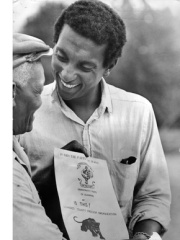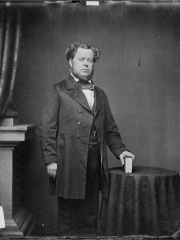

The Most Famous
SOCIAL ACTIVISTS from Trinidad and Tobago
This page contains a list of the greatest Trinidadian Social Activists. The pantheon dataset contains 840 Social Activists, 2 of which were born in Trinidad and Tobago. This makes Trinidad and Tobago the birth place of the 70th most number of Social Activists behind Croatia, and Latvia.
Top 2
The following people are considered by Pantheon to be the most legendary Trinidadian Social Activists of all time. This list of famous Trinidadian Social Activists is sorted by HPI (Historical Popularity Index), a metric that aggregates information on a biography's online popularity.

1. Stokely Carmichael (1941 - 1998)
With an HPI of 68.23, Stokely Carmichael is the most famous Trinidadian Social Activist. His biography has been translated into 30 different languages on wikipedia.
Kwame Ture ( KWAH-may TOOR-ay; born Stokely Standiford Churchill Carmichael; June 29, 1941 – November 15, 1998) was a Trinidadian-American activist who played a major role in the civil rights movement in the United States and the global pan-African movement. Born in Trinidad in the Republic of Trinidad and Tobago, he grew up in the United States from age 11 and became an activist while attending the Bronx High School of Science. Ture was a key leader in the development of the Black Power movement, first while leading the Student Nonviolent Coordinating Committee (SNCC), then as the "Honorary Prime Minister" of the Black Panther Party and as a leader of the All-African People's Revolutionary Party (A-APRP). Carmichael was one of the original SNCC Freedom Riders of 1961 under Diane Nash's leadership. He became a major voting rights activist in Mississippi and Alabama after being mentored by Ella Baker and Bob Moses. Like most young people in the SNCC, he became disillusioned with the two-party system after the 1964 Democratic National Convention failed to recognize the Mississippi Freedom Democratic Party as official delegates from the state. Carmichael eventually decided to develop independent all-black political organizations, such as the Lowndes County Freedom Organization and, for a time, the national Black Panther Party. Inspired by Malcolm X's example, he articulated a philosophy of black power, and popularized it both by provocative speeches and more sober writings. The author Richard Wright is credited with coining the phrase in his 1954 book Black Power. Carmichael became one of the most popular and controversial Black leaders of the late 1960s. FBI director J. Edgar Hoover secretly identified Carmichael as the man most likely to succeed Malcolm X as America's "black messiah". The FBI targeted him for counterintelligence activity through its COINTELPRO program, causing Carmichael to move to Africa in 1968. He reestablished himself in Ghana, and then Guinea by 1969. There, he adopted the name Kwame Ture, and began campaigning internationally for revolutionary socialist pan-Africanism. Ture died of prostate cancer in 1998 at the age of 57.

2. Stephen Mallory (1813 - 1873)
With an HPI of 55.70, Stephen Mallory is the 2nd most famous Trinidadian Social Activist. His biography has been translated into 22 different languages.
Stephen Russell Mallory (1812 – November 9, 1873) was an American politician who was a United States Senator from Florida from 1851 to the secession of his home state and the outbreak of the American Civil War in 1861. For much of that period, he was chairman of the Committee on Naval Affairs. It was a time of rapid naval reform, and he insisted that the ships of the U.S. Navy should be as capable as those of Britain and France, the foremost navies in the world at that time. He also wrote a bill and guided it through Congress to provide for compulsory retirement of officers who did not meet the standards of the profession. Although he was not a leader in the secession movement, Mallory followed his state out of the Union. When the Confederate States of America was formed, he was named Secretary of the Navy in the administration of President Jefferson Davis. He held the position throughout the existence of the Confederacy. Because of indifference to naval matters by most others in the Confederacy, Mallory was able to shape the Confederate Navy according to the principles he had learned while serving in the U.S. Senate. Some of his ideas, such as the incorporation of armor into warship construction, were quite successful and became standard in navies around the world. On the other hand, the navy was often handicapped by administrative ineptitude in the Navy Department. During the war, he was weakened politically by a Congressional investigation into the Navy Department for its failure in defense of New Orleans. After months of taking testimony, the investigating committee concluded that it had no evidence of wrongdoing on his part. Mallory resigned after the Confederate government had fled from Richmond at the end of the war, and he and several of his colleagues in the cabinet were imprisoned and charged with treason. After more than a year in prison, the public mood had softened, and he was granted parole by President Andrew Johnson. He returned to Florida, where he supported his family in his final years by again practicing law. Unable to hold elective office by the terms of his parole, he continued to make his opinions known by writing letters to newspapers. His health began to deteriorate although he was not incapacitated until the very end. He was the father of Stephen Russell Mallory II, a U.S. Representative and U.S. Senator from Florida.
People
Pantheon has 2 people classified as Trinidadian social activists born between 1813 and 1941. Of these 2, none of them are still alive today. The most famous deceased Trinidadian social activists include Stokely Carmichael, and Stephen Mallory.

